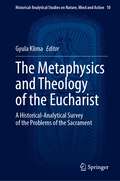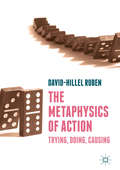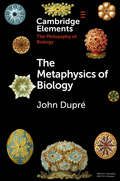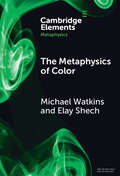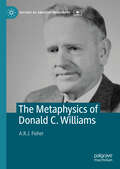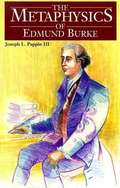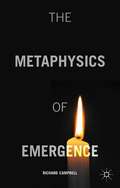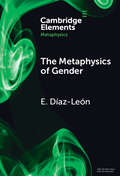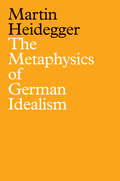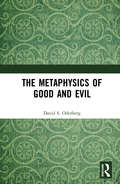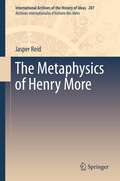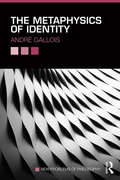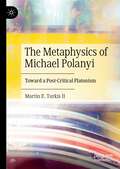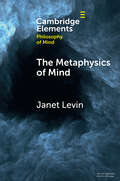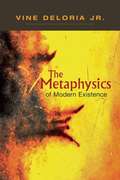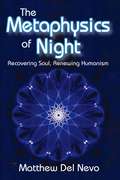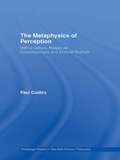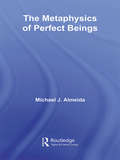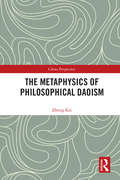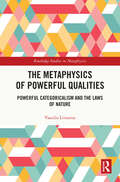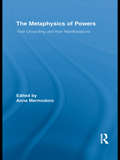- Table View
- List View
The Metaphysics and Mathematics of Arbitrary Objects
by Leon HorstenBuilding on the seminal work of Kit Fine in the 1980s, Leon Horsten here develops a new theory of arbitrary entities. He connects this theory to issues and debates in metaphysics, logic, and contemporary philosophy of mathematics, investigating the relation between specific and arbitrary objects and between specific and arbitrary systems of objects. His book shows how this innovative theory is highly applicable to problems in the philosophy of arithmetic, and explores in particular how arbitrary objects can engage with the nineteenth-century concept of variable mathematical quantities, how they are relevant for debates around mathematical structuralism, and how they can help our understanding of the concept of random variables in statistics. This fully worked through theory will open up new avenues within philosophy of mathematics, bringing in the work of other philosophers such as Saul Kripke, and providing new insights into the development of the foundations of mathematics from the eighteenth century to the present day.
The Metaphysics and Theology of the Eucharist: A Historical-Analytical Survey of the Problems of the Sacrament (Historical-Analytical Studies on Nature, Mind and Action #10)
by Gyula KlimaThis volume is about the most mind-boggling sacrament of the Christian faith, also referred to as the Sacrament of the Altar, the Eucharist: in its Roman Catholic interpretation, the conversion of the substance of the bread and wine into the body and blood of Christ for Holy Communion. The challenge of providing a rational interpretation of this doctrine of faith proved to be one of the most contentious issues in the Western history of ideas, apparently going against self-evident metaphysical principles (requiring accidents existing without a substance, and a body in several places at the same time, etc.), and dividing schools of thought, indeed, eventually, warring religious factions. The volume addresses both the metaphysical, theoretical issues involved in this challenge and the historical, theological developments of how meeting this challenge played out first in the schools and even later in religious schisms, leading to the paradigmatic shift from medieval to modern forms of thought. The essays of the volume derive from the lectures of an eponymous international conference held in Budapest, Hungary, which was also the occasion of founding the Society for the History of European Ideas (SEHI); accordingly, the book is the first volume of the annual Proceedings of the SEHI. This book is aimed just as much at laymen and religious scholars seeking a better understanding of their faith as at anyone seeking this understanding with a non-religious attitude.
The Metaphysics of Action: Trying, Doing, Causing
by David-Hillel RubenIn this book, the author provides an account of three central ideas in the philosophy of action: trying to act, acting or doing, and one’s action causing further consequences. In all three cases, novel theories of these phenomena are offered: trying to act is not a particular mental or physical act but can be explained using conditionals; that action is not the same as causing something to happen; and in the case of a special but important subset of actions, for example the opening of a window, the action is identical to the event of the window’s opening. A result of this last account is that it places actions out in the world, sometimes far removed in time and space from the actor’s body. The world is full of action; actions do not just exist in the many little islands of space and time that all of our bodies inhabit. In the final chapter, Ruben describes and discusses a skeptical challenge to the idea that we can ever know whether or not someone else has acted, rather than just passive events having happened to that person.
The Metaphysics of Biology (Elements in the Philosophy of Biology)
by John DupréThis Element is an introduction to the metaphysics of biology, a very general account of the nature of the living world. The first part of the Element addresses more traditionally philosophical questions - whether biological systems are reducible to the properties of their physical parts, causation and laws of nature, substantialist and processualist accounts of life, and the nature of biological kinds. The second half will offer an understanding of important biological entities, drawing on the earlier discussions. This division should not be taken too seriously, however: the topics in both parts are deeply interconnected. Although this does not claim to be a scientific work, it does aim to be firmly grounded in our best scientific knowledge; it is an exercise in naturalistic metaphysics. Its most distinctive feature is that argues throughout for a view of living systems as processes rather than things or, in the technical philosophical sense, substances.
The Metaphysics of Color (Elements in Metaphysics)
by Michael Watkins Elay ShechThis Element offers an opinionated and selective introduction to philosophical issues concerning the metaphysics of color. The opinion defended is that colors are objective features of our world; objects are colored, and they have those colors independent of how they are experienced. It is a minority opinion. Many philosophers thinking about color experience argue that perceptual variation, the fact that color experiences vary from observer to observer and from viewing condition to viewing condition, makes objectivism untenable. Many philosophers thinking about colors and science argue that colors are ontologically unnecessary; nothing to be explained requires an appeal to colors. A careful look at arguments from perceptual variation shows that those arguments are not compelling, and especially once it is clear how to individuate colors. Moreover, a careful look at scientific explanations shows that colors are explanatorily essential. This title is also available as Open Access on Cambridge Core.
The Metaphysics of Donald C. Williams (History of Analytic Philosophy)
by A.R.J. FisherThe thesis of this book is that Williams played a key role in the development and revival of analytic metaphysics. This book begins with an account of Williams' approach to philosophy given the rise of realism in the early twentieth century, with a focus on his use of induction and parsimony to argue for metaphysical theses such as metaphysical realism and metaphysical naturalism. It explains his critique of logical positivism and his defence of an empirical conception of metaphysics, which in turn reveals how he took himself to be standing up to rising anti-metaphysical trends. This book then expounds—within the framework of his empirical metaphysics—his one-category trope ontology and its origins, arguing that his systematisation of the concept of an abstract particular (or trope) is his most novel contribution to analytic ontology. This book further presents an original interpretation of his account of concrete objects and abstract universals, engaging with current debates in the metaphysics of properties—sometimes defending Williams, sometimes correcting misinterpretations, sometimes critically reassessing his views. This book also explains his defence of the four-dimensional manifold of time and his objections to competing theories such as the growing block theory and presentism (incorporating recently posthumously published work in The Elements and Patterns of Being, ed. A.R.J. Fisher, 2018), with up-to-date references to the latest work in the metaphysics of time. Lastly, this book analyses Williams's influence on later philosophers such as Lewis and Armstrong (and others in Australia), drawing from correspondence between Williams, Lewis, and Armstrong, and evaluates his place in the history of analytic philosophy, concluding that he played a key role in the development and revival of analytic metaphysics.
The Metaphysics of Edmund Burke
by Joseph L. PappinThe most recent commentators on Edmund Burke have renewed the charge that his political thought lacks the consistency and coherency necessary to even claim the status of a political philosophy and that he is indeed a "utilitarian." They mark him off as an "ideologist," a "rhetorician," and a "deliberate propagandist." Directly opposed to this renewed "utilitarian" interpretation of Burke is Joseph Pappin’s work The Metaphysics of Edmund Burke. Not only does this work challenge the "utilitarian" view of Burke, it sets out, as not other work on Burke has attempted to do, "to make explicit the implicit metaphysical core of Burke’s political thought." Pappin does this by examining both Burke’s critics and Burke’s own attack on a rationalist, ideologically inspired metaphysics.
The Metaphysics of Emergence
by Richard CampbellEverything in the Universe has emerged, in some sense, since the Big Bang. But the concept of emergence is problematic and controversial. The Metaphysics of Emergence contends that the contemporary philosophical debates are vitiated by the persistence of the traditional assumption that what primarily exists are particular entities: things. Instead it presents a sustained argument for recognizing generic processes as primary. This radical alternative finds support from interpreting the sub-atomic 'particles' of contemporary physics as nodes in a quantum field, and resolves long-standing problems of explaining identity over time. Campbell then proceeds to develop a metaphysical taxonomy of emergent entities, showing how all biological creatures maintain themselves by changing their interaction with their environments. This approach enables a fruitful account of emergence, and provides reasons to reject the widespread view that reality is determined by its physical basis. The book concludes with a discussion of human mentality, values, and freedom.
The Metaphysics of Experience: A Companion to Whitehead's Process and Reality (American Philosophy #No. 9)
by Elizabeth KrausThe Metaphysics of Experience styles itself as "a Sherpa guide to Process and Reality, whose function is to assist the serious reader in grasping the meaning of the text and to prevent falls into misinterpretation." Although originally published in 1925, Process and Reality has perhaps even more relevance to the contemporary scene in physics, biology, psychology, and the social sciences than it had in the mid-twenties. Hence its internal difficulty, its quasi-inaccessibility, is all the more tragic, since, unlike most metaphysical endeavors, it is capable of interpreting and unifying theories in the above sciences in terms of an organic world view, instead of selecting one theory as the paradigm and reducing all others to it. Because Alfred North Whitehead is so crucial to modern philosophy, The Metaphysics of Experience plays an important role in making Process and Reality accessible to a wider readership.
The Metaphysics of Gender (Elements in Metaphysics)
by E. Díaz LeónWhat is the metaphysics of gender about? Metaphysics is the study of what there is and what it is like. On this conception, questions in the metaphysics of gender would be about the existence and nature of gender. That is, the metaphysics of gender would be about whether alleged gender categories such as being a man, a woman or an agender person are real features or kinds, and if so, what their nature is. In recent years, the metaphysics of gender has received a lot of attention and has shifted from being a rather marginal part of metaphysics to being a growing area of interest. Moreover, growing attention to the metaphysics of gender and the social domain have given rise to fruitful methodological questions about what metaphysics is about and what are the best methods to pursue metaphysical inquiries. This Element offers a survey of recent discussions of these questions.
The Metaphysics of German Idealism: A New Interpretation of Schelling's Philosophical Investigations into the Essence of Human Freedom and Matters
by Martin HeideggerThis volume comprises the lecture course that Heidegger gave in 1941 on the metaphysics of German Idealism. The first part of the lecture course contains a preliminary consideration of the distinction between ground and existence. The elucidation of the conceptual history includes a striking confrontation with Kierkegaard’s and Jaspers’ concepts of existence, as well as an elucidation of the concept of existence in Being and Time, which Heidegger distinguishes from the former concepts. Heidegger’s self-interpretation is not an end in itself, however, but rather a way of pointing to Schelling’s distinction between ground and existence, whose root and inner necessity and whose various versions Heidegger discusses subsequently. The second part of the lecture course is focused on Schelling’s “freedom treatise,” which Heidegger regards as the pinnacle of the metaphysics of German Idealism. Heidegger’s consideration of Schelling’s distinction between ground and existence finds its guiding thread in the introduction of the realms of being – eternal or finite, each being is a joining of the ground of existence and existence itself. In a subsequent overview, Heidegger discusses the relation of the distinction between ground and existence to the essence of human freedom and to the essence of the human. On the basis of this discussion, it becomes possible to grasp the connection between freedom and evil in Schelling’s system. This important work by Heidegger, published here in English for the first time, will be of great interest to students and scholars of philosophy and to anyone interested in Heidegger’s work.
The Metaphysics of Good and Evil
by David S. OderbergThe Metaphysics of Good and Evil is the first, full-length contemporary defence, from the perspective of analytic philosophy, of the Scholastic theory of good and evil – the theory of Aristotle, Augustine, Aquinas, and most medieval and Thomistic philosophers. Goodness is analysed as obedience to nature. Evil is analysed as the privation of goodness. Goodness, surprisingly, is found in the non-living world, but in the living world it takes on a special character. The book analyses various kinds of goodness, showing how they fit into the Scholastic theory. The privation theory of evil is given its most comprehensive contemporary defence, including an account of truthmakers for truths of privation and an analysis of how causation by privation should be understood. In the end, all evil is deviance – a departure from the goodness prescribed by a thing’s essential nature. Key Features: Offers a comprehensive defence of a venerable metaphysical theory, conducted using the concepts and methods of analytic philosophy. Revives a much neglected approach to the question of good and evil in their most general nature. Shows how Aristotelian-Thomistic theory has more than historical relevance to a fundamental philosophical issue, but can be applied in a way that is both defensible and yet accessible to the modern philosopher. Provides what, for the Scholastic philosopher, is arguably the only solid metaphysical foundation for a separate treatment of the origins of morality.
The Metaphysics of Henry More
by Jasper ReidThe book surveys the key metaphysical contributions of the Cambridge Platonist, Henry More (1614-1687). It deals with such interwoven topics as: the natures of body and spirit, and the question of whether or not there is a sharp ontological division between them; the nature of spatial extension in relation to each; the composition and governance of the physical world, including More's theories of Hyle, atoms, vacuum, and the Spirit of Nature; and the life of the human soul, including its pre-existence. It approaches these topics and the systematic connections between them both historically and analytically, and seeks to do justice to the ways in which More's system developed and changed--sometimes quite dramatically--over the course of his long career. It also explores More's intellectual relations with both his own inspirations (Plotinus, Origen, Ficino, Descartes, etc.) and with those who responded, whether positively or negatively, to his work (Leibniz, Locke, Boyle, Newton, etc.).
The Metaphysics of Identity (New Problems of Philosophy)
by André GalloisThe philosophical problem of identity and the related problem of change go back to the ancient Greek philosophers and fascinated later figures including Leibniz, Locke, and Hume. Heraclitus argued that one could not swim in the same river twice because new waters were ever flowing in. When is a river not the same river? If one removes one plank at a time when is a ship no longer a ship? What is the basic nature of identity and persistence? In this book, André Gallois introduces and assesses the philosophical puzzles posed by things persisting through time. Beginning with essential historical background to the problem he explores the following key topics and debates: mereology and identity, including arguments from 'Leibniz's Law' the constitution view of identity the 'relative identity' argument concerning identity temporary identity four-dimensionalism, counterpart and multiple counterpart theory supervenience the problem of temporary intrinsics the necessity of identity Indeterminate identity presentism criteria of identity conventionalism about identity. Including chapter summaries, annotated further reading and a glossary, this book is essential reading for anyone seeking a clear and informative introduction to and assessment of the metaphysics of identity.
The Metaphysics of Logic
by Penelope RushFeaturing fourteen new essays from an international team of renowned contributors, this volume explores the key issues, debates and questions in the metaphysics of logic. The book is structured in three parts, looking first at the main positions in the nature of logic, such as realism, pluralism, relativism, objectivity, nihilism, conceptualism, and conventionalism, then focusing on historical topics such as the medieval Aristotelian view of logic, the problem of universals, and Bolzano's logical realism. The final section tackles specific issues such as glutty theories, contradiction, the metaphysical conception of logical truth, and the possible revision of logic. The volume will provide readers with a rich and wide-ranging survey, a valuable digest of the many views in this area, and a long overdue investigation of logic's relationship to us and the world. It will be of interest to a wide range of scholars and students of philosophy, logic, and mathematics.
The Metaphysics of Michael Polanyi: Toward a Post-Critical Platonism
by Martin E. Turkis IIThis book tells the story of how the Platonic vision of Michael Polanyi – the Hungarian-British chemist and philosopher – bridges the gap between speculative metaphysics and scientific practice, thus making sense of the broad swathe of human experience in a phenomenologically satisfying fashion. The central proposal is that Polanyi is a Platonist due to his affirmation of the ontological status of abstract objects, with particular focus placed on the question of uninstantiated universals. The book engages contemporary, speculative realists from both continental and analytic traditions as it introduces Polanyi’s influential epistemology and unpacks the fascinating metaphysics implied thereby. It then proceeds to develop Polanyi’s rather unsystematic metaphysics into a coherent, post-critical Platonism which incorporates his well-known theory of tacit knowledge, thus achieving something akin to the ancient Neoplatonic synthesis of Plato and Aristotle in our contemporary, scientific context.
The Metaphysics of Mind (Elements in Philosophy of Mind)
by Janet LevinThe Metaphysics of Mind presents and discusses the major contemporary theories of the nature of mind, including Dualism, Physicalism, Role-Functionalism, Russellian Monism, Panpsychism, and Eliminativism. Its primary goal is to examine the strengths and weaknesses of the theories in question, including their prospects for explaining the special qualitative character of sensations and perceptual experiences, the special outer-directedness of beliefs, desires, and other intentional states, and—more generally—the place of mind in the world of nature, and the relation between mental states and the behaviors that they (seem to) cause. It also discusses, briefly, some further questions about the metaphysics of mind, namely, whether groups of individuals, or entire communities, can possess mental states that cannot be reduced to the mental states of the individuals in those communities, and whether the boundaries between mind and world are as sharp as they may seem.
The Metaphysics of Modern Existence
by David E. Wilkins Vine Deloria Jr. Daniel R. WildcatVine Deloria Jr., named one of the most influential religious thinkers in the world by Time, shares a framework for a new vision of reality. Bridging science and religion to form an integrated idea of the world, while recognizing the importance of tribal wisdom, The Metaphysics of Modern Existence delivers a revolutionary view of our future and our world. David E. Wilkins holds the McKnight Presidential Professorship in American Indian Studies at the University of Minnesota. Daniel R. Wildcat is the director of the American Indian studies program and the Haskell Environmental Research Studies Center at Haskell Indian Nations University.
The Metaphysics of Morals
by Immanuel KantIf moral principles apply to everyone, in every situation, at all times, they must be based on concepts of reason rather than on culture or individual personality. "The Metaphysics of Morals" uncovers the principles that guide moral duties and determine the moral compass for good will. By explaining why actions are moral only if they are intentionally moral (not for ulterior motive) and why intention is more important than the outcome of an act (with respect to morality), Kant makes the case for a definable basis for human morality.
The Metaphysics of Night: Recovering Soul, Renewing Humanism
by Matthew Del NevoThe Metaphysics of Night acknowledges a post-secular philosophy, one that puts philosophy into serious dialogue with religion, rather than considering religion a thing of the past. Matthew Del Nevo deals with the cultural unconscious, inseparable from religious consciousness, and draws on psychoanalysis and literature as well as philosophy. The metaphysics of the night is Del Nevo's metaphor for the deep and mysterious expanse of the soul. Philosophically, the book is critical of Enlightenment presumptions about knowledge and truth and overly spiritualizing tendencies in religion. Its critical edge cuts against materialist and historicist tendencies in the humanities and abstract intellectualism in philosophy. Arguing for strong aesthetic values, Del Nevo defends and explains soul and soulful experience, the creation of depth, the ineffable, real presence, beauty, and saving words, noting that the sources of all these are in us, but often are blocked. Each of the five parts of this book testify to what the author notes may be forgotten, but which ought not to be forgotten. It is necessary for life as socially, religiously, and educationally instituted within culture and as constitutive for culture. Del Nevo deals with sensibility as a form of wisdom and instinct that is not cognitive or knowledge/information based. He argues for a shift of emphasis in culture from intellect to intuition. This well-written work, filled with Catholic, philosophic, and artistic thought will be of interest to all philosophers, theologians, and students of culture.
The Metaphysics of Perception: Wilfrid Sellars, Perceptual Consciousness and Critical Realism (Routledge Studies in Twentieth-Century Philosophy)
by Paul CoatesThis book is an important study in the philosophy of the mind; drawing on the work of philosopher Wilfrid Sellars and the theory of critical realism to develop a novel argument for understanding perception and metaphysics.
The Metaphysics of Perfect Beings (Routledge Studies in the Philosophy of Religion #Vol. 5)
by Michael J. AlmeidaThe Metaphysics of Perfect Beings addresses the problems an Anselmian perfect being faces in contexts involving unlimited options. Recent advances in the theory of vagueness, the metaphysics of multiverses and hyperspace, the theory of dynamic or sequential choice, the logic of moral and rational dilemmas, and metaethical theory provide the resources to formulate the new challenges and the Anselmian responses with an unusual degree of precision. Almeida shows that the challenges arising in the unusual contexts involving unlimited options sometimes produce metaphysical surprise.
The Metaphysics of Philosophical Daoism (China Perspectives)
by Kai ZhengDrawing on evidence from a wide range of classical Chinese texts, this book argues that xingershangxue, the study of "beyond form", constitutes the core argument and intellectual foundation of Daoist philosophy. The author presents Daoist xingershangxue as a typical concept of metaphysics distinct from that of the natural philosophy and metaphysics of ancient Greece since it focusses on understanding the world beyond perceivable objects and phenomena as well as names that are definable in their social, political, or moral structures. In comparison with other philosophical traditions in the East and West, the book discusses the ideas of dao, de, and "spontaneously self-so", which shows Daoist xingershangxue’s theoretical tendency to transcendence. The author explains the differences between Daoist philosophy and ancient Greek philosophy and proposes that Daoist philosophy is the study of xingershangxue in nature, providing a valuable resource for scholars interested in Chinese philosophy, Daoism, and comparative philosophy.
The Metaphysics of Powerful Qualities: Powerful Categoricalism and the Laws of Nature (Routledge Studies in Metaphysics)
by Vassilis LivaniosThis book examines the metaphysical issues regarding the powerful qualities view in all its various forms. The author also develops and defends his own version of the powerful qualities view, which he calls powerful categoricalism.In recent years, the powerful qualities view about the nature of properties has received considerable attention in the philosophical literature. The core tenet of the powerful qualities view is that properties are both dispositional and categorical/qualitative. Despite the increased popularity of the powerful qualities view, there is no book-length presentation of the view in its distinct versions. The first part of this book analyses the advantages and drawbacks of each version of the theory, paying special attention to those difficulties that make it unstable and perhaps incomprehensible. In the second part, the author shows how a developed version of a dualist model for the origin of natural modality—according to which the specific behaviour of things in the world is the outcome of both the thin power properties have to be nomically relatable and certain nomic relations that determine properties’ nomological role—can support an alternative understanding of the main tenet of the powerful qualities view. This part, in combination with the discussion of the difficulties of the other versions, not only defends the tenability of powerful categoricalism but also its superiority over the other extant versions.The Metaphysics of Powerful Qualities makes an original contribution to an ongoing debate in contemporary metaphysics.
The Metaphysics of Powers: Their Grounding and their Manifestations (Routledge Studies In Metaphysics Ser. #2)
by Anna MarmodoroThis volume is a collection of papers that advance our understanding of the metaphysics of powers — properties such as fragility and electric charge. The metaphysics of powers is a fast developing research field with fundamental questions at the forefront of current research, such as Can there be a world of only powers? What is the manifestation of a power? Are powers and their manifestations related by necessity? What are the prospects for dispositional accounts of causation? The papers focus on questions concerning the metaphysics of powers that cut across any particular subject-specific ontological domain -- whether philosophy of science, philosophy of mind, ethics, epistemology – investigating the metaphysical structure of powers, the nature of the manifestation of powers, the necessity or contingency of a power’s relation to its manifestations, and powers and causation. A number of authors also engage in discussion with Humean and neo-Humean treatments of causation, thereby making contributions to a larger metaphysical debate beyond powers. Additionally, the authors engage critically with the latest contributions to the debate on powers in the literature, thereby bringing together in a wholesome and analytical way the most recent and noteworthy theoretical developments in this research field.

